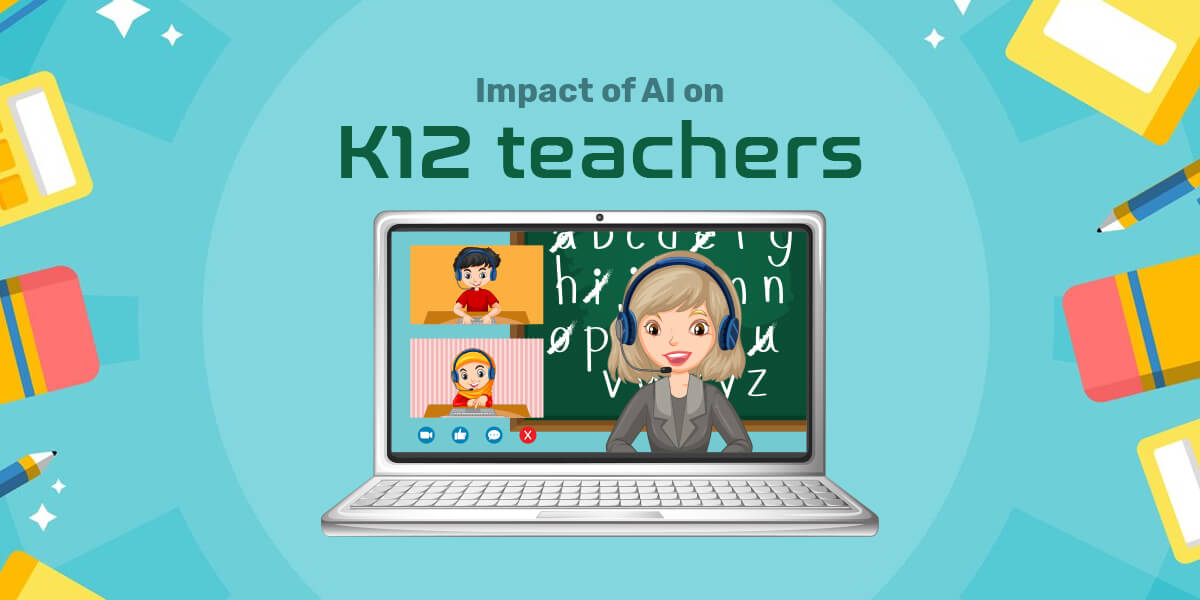The use of artificial intelligence (AI) has resulted in a significant change in our day-to-day life. The impact of artificial intelligence can be witnessed in diverse industries and businesses. Out of all the emerging technologies, artificial intelligence (AI) is creating an impact on K12 learning and higher education.
Educational institutions around the world are in the race to leverage emerging technologies to make student learning more efficient.
Artificial intelligence (AI) is the ability of a computer program to perform tasks like learning, thinking just like humans do. According to a report by Technavio on the artificial intelligence market in the US education sector, there is a 48 percent growth rate in the use of artificial intelligence (AI) tools over the next three years.
K12 teachers are under great stress and pressure
- K12 teachers are under tremendous stress and pressure due to the rising demands and needs of the learners.
- Teacher turnover continues to be a great problem for educational institutions in the US.
- It is becoming difficult for US schools to hire new teachers and retain the existing ones.
- There is a significant shortage in the number of K12 teachers in the United States.
- Every year around 8 percent of teachers are leaving the profession.
- A research conducted by McKinsey and Microsoft suggest that teachers are working an average of 50 hours in a week.
- The teacher turnover rate in the neediest schools in the United States tops 16 percent per year.
- The administrative burden on teachers is increasing tremendously.
- The high turnover and attrition rates in the teaching profession is an indicator of the real pressure that the teachers are reeling under.
- Most teachers report that they enjoy teaching. However, they do not report enjoying making question papers late at night, assessing the answer sheets, making lesson plans and doing endless paperwork.
- A recent research suggests that 20 to 40 percent of the time spent by teachers on administrative activities can be automated using the latest education technologies.
- The effective use of technology can help teachers to reallocate 20 to 40 percent of their unproductive time to productive activities for improving student outcomes.
- Out of the 50 hours a week that a teacher works, less than half of the time is spent in direct interaction with students.
- Majority of the time spent by K12 teachers is for preparation, evaluation, and administrative tasks.
The use of artificial intelligence (AI) can make the life of K12 teachers stress-free
Automation of mundane administrative tasks
- The implementation of emerging technologies like artificial intelligence can automate monotonous administrative tasks like grading assignments, evaluation of answer papers, etc.
- Instead of grading every student’s assignment individually, the use of various artificial intelligence (AI) tools can help to automatically grade the students’ work simultaneously.
- AI-powered automation reduces the workload on teachers and gives them sufficient time to focus on student learning.
Assisting teachers with preparatory activities
- On an average, teachers in the US spend nearly 11 hours per week on preparation activities.
- The effective use of technology can help automate the preparatory activities before teachers begin the class.
- By making use of educational technologies, the time for preparatory activities can be cut down to just hours 6 per week for K12 teachers.
- Also, the use of artificial intelligence (AI) tools can make the preparation activities more efficient, thus enabling them to create better lesson plans and approaches.
- There are various mathematics tools available that help teachers analyze the present level of students’ understanding, group students according to their needs, and suggest lesson plans and problem solving activities.
- This helps to reduce the burden on the teachers.
Personalized learning
- Artificial intelligence (AI) can be used to facilitate personalized learning through the use of innovative and interactive learning programs.
- An education system powered by artificial intelligence (AI) allows K12 teachers to cater to the individual needs of a student.
- By using education technologies, K12 teachers can focus more on the topics that students find difficult to grasp.
- Artificial Intelligence (AI) tools can identify the strengths and weaknesses of a learner so that the teachers can follow a personalized learning approach.
Blended learning
- With the help of various AI tools, K12 teachers can incorporate blended learning into the physical brick and mortar classrooms to make learning fun and interactive for the learners.
- Blended learning can make education more accessible to students. Better accessibility to learning resources translates to improving student outcomes.
Immediate access to resources
- Artificial intelligence (AI) tools connect K12 teachers with the right resources whenever they need them.
- Instant access to quality resources means teachers can save a lot of time and energy as well.
Considering the increasing adoption of artificial intelligence (AI), it is going to be the future of work for K12 teachers and educational institutions globally.

